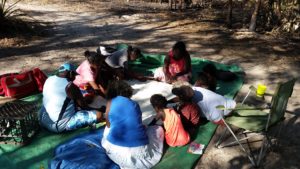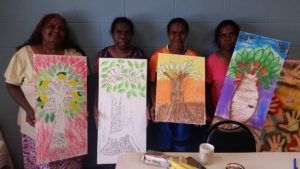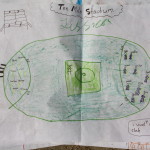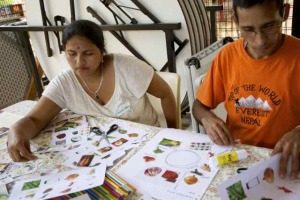…metaphorically speaking offers a range of opportunities to engage people in therapeutic groups. All these methods draw on the strengths in people’s lives rather than dwell on the problem story which so often comes to dominate their experience and view of themselves. Participants are able to work through traumatic experiences without speaking directly about it using artistic expression and storytelling metaphors. When people reconnect with their values, knowledge, abilities, hopes and the actions they have taken previously to overcome hard times, neural pathways are strengthened and possibilities for a preferred identity is shaped. There are opportunities for connecting and contributing stories of strength to the lives of others who are living with hardship.
Tree of Life
Offers a safe way of exploring the difficulties of life and honouring strengths, using the tree metaphor. Using art materials, participants create their journey starting with the roots (their connections to family history, country, ancestors, favourite places, special people and cultural treasures); the trunk (their skills and abilities); the ground (their daily activities); the branches (their hopes and dreams); the leaves (people who have contributed to their life) and fruits (the gifts they have received). Participants explore what it means to be part of a forest (peers, family or community) and the various actions taken to withstand the storms of life (difficulties in life). The process makes more richly known the stories of resistence taken by participants in response to trauma and how healing happens in families and communities.
- Children 8+, youth, women, families
- Aboriginal people who have connections to culture and a sense of belonging to country or would like to strengthen this aspect of themselves
- People who have experienced trauma in their lives
Team of Life
This approach invites participants to think about their lives as if it were a sporting team. Throughout life there may be particular players who were always on the field with you and others who might sit on the side lines and cheer you on from time to time. There is likely to be a coach, one person you can rely on for advice or guidance. Participants draw their home ground and document their goal keepers, defense, offence, substitutes, supporters and first aiders in their Team of Life. Team songs might be developed. Favourite positions are explored. Stories about goals their team have achieved together are re-enacted. Future goal maps are planned to explore the training required, building on existing skills and resources.
Ideal for:
- Men, boys, women, girls, youth, children 5+, families
- People who can relate to a team sport e.g. football, soccer, basketball
- People who may be experiencing major life changes e.g. release from prison
- Children and young people experiencing life challenges e.g. bullying, racism, living away from home
Recipes of Life
Have you ever noticed how much easier it is to talk about the tough stuff while cooking in the kitchen? This program created by Natalie Rudland-Wood, uses the metaphor of food to explore people’s strengths, skills, abilities and knowledge. Participants create their own Recipe of Life documenting rich descriptions of the positive ways they have got through hard times. Participants walk away with their own Recipe Book of favourite food recipes cooked during the program and Life Recipes for surviving hard times shared by the group. The group has the option of sharing their Recipes more widely with those who might be experiencing similar difficulties and would benefit from the wisdom of the group.
- Women, men, youth
- People who love cooking or are willing to try something new
- People who have experienced trauma in their lives
Narratives in my Dilly Bag (or Suitcase)
The dilly bag is what we take with us when we set off hunting hopefully to bring back some tucker in. The dilly bag can also represent the journeys we have taken in life. Some people have moved around a lot on their journeys or were taken away against their wishes and haven’t had the opportunity to take much with them. They have spent time away from home for different reasons; maybe they can’t go back. But the things we all carry with us are memories, special trinkets and stories. We have good memories that we want to proudly display on the outside. Bad memories might be tucked safely away on the inside of our bag. This project uses a variety of tactile art-making experiences to process narratives in a way which allows participants to carry on into the future with their dilly bag intact.
Ideal for:
- Children 5+, youth, women
- People who have moved around a lot or spent a lot of time away from their home e.g. foster children, women who have experienced domestic violence, homelessness or imprisonment
- refugees and asylum seekers (however the art project would be making suitcases)
Healing Group and Community Work
 …metaphorically speaking can develop a group or community program based on your particular needs incorporating the methodologies of art and narrative therapies.
…metaphorically speaking can develop a group or community program based on your particular needs incorporating the methodologies of art and narrative therapies.
Our work acknowledges the strong stories of participants in overcoming hardship. We believe that problems are the problem, not people. We aim to find ways of re-authoring stories of identity alongside the people we work with, to find the stories they want to tell about themselves. These may be stories about skills, knowledge, abilities and values that have been important in getting through hard times. With participants permission, we find ways of developing and delivering ‘a message stick’ to others who might be going through hard times through Narrative Collective Documents. Sending positive messages using video, audio, written word or art expressions can be an empowering process for both the story teller and witness.
Examples of Work
Lucy was invited to co-facilitate a Tree of Life workshop as part of the Telling Story project with women on the Tiwi Islands. Watch a video about the workshop and read the collective document created by the women on Weathering the Storms of Life.
Messages of Hope was created by the women of the Tiwi Islands, who shared what keeps them strong in the face of hard times, after some facilitated narrative, art therapy group sessions.
‘A group of asylum seekers and refugees living in Darwin came together for a 6 week ‘Recipes of Life’ project. You can download their Recipes Book, a collective narrative document, featuring their favourite recipes for eating and living.
If you would like more information about group work tailored to your needs, please Contact Us. We also welcome invitations to work with your organisation to train, support and mentor staff in using these methodologies in sustainable ways.



